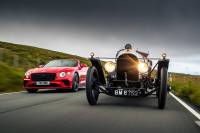Bentley’s Flying B: The Art of the ‘Bonnet Mascot’ Lives On
Bentley gives us an inside look at the 11-week process it goes through just to cast its Flying B hood ornament. Oh, and definitely don’t call it a hood ornament.
There was a time when every car had a hood ornament gracing its nose. The ornaments were actually functional and not just status symbols; they indicated if there was water in the radiator, and sometimes the temperature.
For Bentley, the hood ornament continues to be an important part of the brand’s image. The automaker is still offering vehicles with some of the best characteristics from a bygone time; a time when handcrafting, impeccable quality, and opulence ruled the road.
Today, it takes 11 weeks for a Bentley Flying B hood ornament to go from mold to complete. Well, semi-complete, because it then goes off to another company where the crystal acrylic wings and tiny LED lights are fitted. Only then does it make its way to a car.
Oh, and don’t call it a hood ornament. Bentley calls it a “bonnet mascot.”
Lost Wax Casting for the Flying B

Casting is done by Lestercast, a U.K. casting expert that makes parts for automotive, marine, and even nuclear applications. It uses a lost wax process that takes more time but delivers a better finish and tighter tolerances than sand casting.
Lestercast injects molten wax into a die to create the mold. A ceramic coating is then applied to the hardened wax and left to set. Once the ceramic sets, the wax is melted away to leave a ceramic mold with a hollow cavity inside. It’s a long way to get to the mold, but for Bentley and buyers, the end result is worth the effort.

Heated to just under 3,000 degrees, molten 316 stainless steel is poured into the mold. Once it cools, the ceramic skin is dissolved and removed. The next stage is shot blasting, where any tiny remaining traces of ceramic are removed.
Only then does hand polishing start, to bring out the luster of the stainless steel and make the Flying B pop.
Nearly All Flying Spurs Get the Bentley Flying B

The Bentley Flying B is an option on the Flying Spur, but it’s an extremely popular one — 97% of all orders include the mascot. The Continental and Bentayga don’t offer the feature. Instead, they come with a cowl-mounted Flying B badge, cementing the Flying Spur’s spot at the top of the lineup.
This latest design is the company’s sixth iteration of the B. It’s the first one deployed electronically, popping in and out of the hood, and the first to store behind a cover plate as well. The coolest feature? This “bonnet mascot” is also the first to get internal illumination, making it the most advanced Flying B.
The Flying B Has Adorned Cars for 100 Years

Bentley’s first Flying B came along in the 1920s. It was a replacement for the original hood adornment, which was actually a gauge to help you monitor the car’s radiator. Even Bentley isn’t sure who exactly penned the first mascot.
A sleeker design came along in 1933 to fit the company’s sleeker cars. It was designed by Charles Sykes, also responsible for the Rolls-Royce Spirit of Ecstasy ornament. More sporting MR and MX Overdrive Bentleys could get a rear-leaning Flying B, meant to show that you were driving one of the quicker cars.

The End of the Flying B & Its Resurrection
Safety regulations put an end to the Flying B in the 1970s. Solid ornaments were banned in many places because they had a habit of puncturing pedestrians in a crash. It took until 2006 for Bentley to bring it back when it developed the safety- and theft-friendly mechanically retractable mechanism that launched with the Azure and Arnage.
The latest version arrived for Bentley’s centenary in 2019. Designed by Hoe Young Hwang, the B is inspired by the owl. Bentley says it “represents an owl gliding over a calm lake in pursuit of prey, the mascot’s widening base tracing out the wake created on the water.”
The post Bentley’s Flying B: The Art of the ‘Bonnet Mascot’ Lives On appeared first on GearJunkie.

